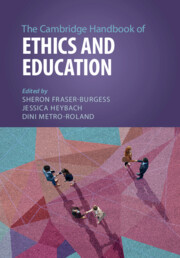Book contents
- The Cambridge Handbook of Ethics and Education
- The Cambridge Handbook of Ethics and Education
- Copyright page
- Epigraph
- Contents
- Figures
- Tables
- Contributors
- Foreword
- Preface
- Acknowledgments
- Part I Traditions in Ethics and Education
- Part II Ethics and Education in Practice
- Part III Emerging Ethical Pathways and Frameworks
- 28 Defining Moral Responsibility for School Leaders in Times of Democratic Crisis
- 29 Convivialism, Interdependence, and Education
- 30 New Existentialism
- 31 Antiracist Moral and Civic Education
- 32 A Decolonial Feminist Perspective
- 33 Ethics and Mindful Leadership in Education
- 34 Ethics as a Field Discipline in the Classroom
- 35 Centering an Environmental Ethic in Climate Crisis
- 36 Ethical Inquiry in Educational Research
- 37 Education and the Technological Horizon
- 38 Teaching in Credal Deep Pluralism
- 39 A Pragmatic Approach to Ethics in Education
- 40 Spectatorship, Black Bodies, and Urban Education
- Index
- References
31 - Antiracist Moral and Civic Education
from Part III - Emerging Ethical Pathways and Frameworks
Published online by Cambridge University Press: 07 March 2024
- The Cambridge Handbook of Ethics and Education
- The Cambridge Handbook of Ethics and Education
- Copyright page
- Epigraph
- Contents
- Figures
- Tables
- Contributors
- Foreword
- Preface
- Acknowledgments
- Part I Traditions in Ethics and Education
- Part II Ethics and Education in Practice
- Part III Emerging Ethical Pathways and Frameworks
- 28 Defining Moral Responsibility for School Leaders in Times of Democratic Crisis
- 29 Convivialism, Interdependence, and Education
- 30 New Existentialism
- 31 Antiracist Moral and Civic Education
- 32 A Decolonial Feminist Perspective
- 33 Ethics and Mindful Leadership in Education
- 34 Ethics as a Field Discipline in the Classroom
- 35 Centering an Environmental Ethic in Climate Crisis
- 36 Ethical Inquiry in Educational Research
- 37 Education and the Technological Horizon
- 38 Teaching in Credal Deep Pluralism
- 39 A Pragmatic Approach to Ethics in Education
- 40 Spectatorship, Black Bodies, and Urban Education
- Index
- References
Summary
Antiracist moral and civic education should educate about both interpersonal racism (racism toward other individuals) and institutional racism (systemic racial injustices). Both areas involve both avoiding racial wrongs (stereotyping, antipathy, demeaning the other) and promoting positive racial goods (respecting racial others as equals, recognizing positive racial difference). Institutional racism requires civic education, to recognize patterns of injustice, to analyze their causes, and to be able to measure them against both morally sound and nationally salient ideals (such as equality, liberty, and justice). Antiracist education must be sensitive to students’ particular racial identities and to asymmetries between the way white and nonwhite identities function morally and civically. It must teach positive racial ideals of racial justice, understanding, and harmony.
- Type
- Chapter
- Information
- The Cambridge Handbook of Ethics and Education , pp. 657 - 675Publisher: Cambridge University PressPrint publication year: 2024

